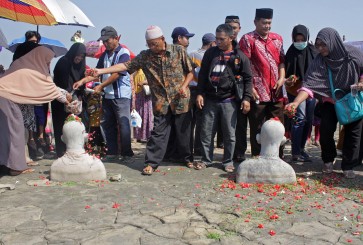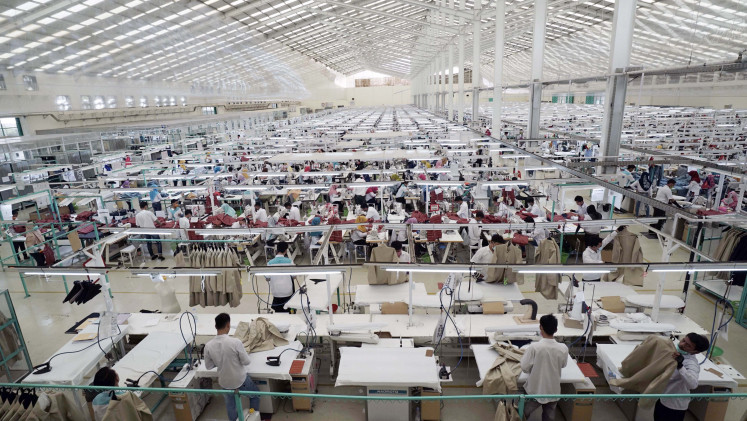Energizing Indonesia’s energy sector
There can be no doubt about the potential of Indonesia’s energy potential, although potential is exactly what it is
Change text size
Gift Premium Articles
to Anyone

T
here can be no doubt about the potential of Indonesia’s energy potential, although potential is exactly what it is.
There can be no doubt either that there is a lot happening outside of the main energy sectors that are well known, i.e. oil, gas, geothermal, hydropower, some companies are going quietly about their business and trying to develop extremely complicated fields, not so much in the resource aspects, but in the geological and environmental aspects.
All resource developments have their own unique challenges, especially resources that are located offshore or in onshore remote parts of this hugely divest archipelago.
Most people in the resource industry accept these challenges, and these challenges can and must be met head on as part of the stages to reach the end goal, namely delivery of a resource to the end user which is commercially viable as well as ensuring that the local community and the county benefit.
There have been three news articles in The Jakarta Post recently that caught my eyes. “Rising fuel imports stifle Pertamina,” “RI lags behind peers in renewable energy,” “ExxonMobil exit warning of waning oil, gas industry.” Surely these three headlines alone say something? Another headline said “Geothermal power requires incentives.”
There was a publication from IPA for the 41st IPA that indicated that the number of licenses required for oil and gas development had increased from 341 in 2015 to 373 in 2017 with the main increases coming from the Energy and Mineral Resources Ministry 74 (52), Transportation Ministry 76 (58), Navy nine (2), only four ministries/agencies from 19 had decreased their requirements, some remained the same.
We have seen recently several companies that have decided enough is enough, such as Marathon, Anadarko, HESS and now ExxonMobil. All of these companies and more have worked in what is considered far more difficult countries to develop a business, such as Nigeria which appears to becoming more attractive than Indonesia.
Every country has its ups and downs, although in Indonesia we have been seeing a steady decline of the natural resource industry for many years. We can also argue the same for the mineral resource sector.
Why is this when a country has such potential, not just with its abundance of natural resources, but also human resources?
I was making a presentation the other week to an Indonesian oil company when I was asked what is delaying me getting projects in Indonesia. My answer was, “do you really want to know,” he said yes. I mentioned several points which included acceptance of new technology, regulations.
Other comments I cannot mention in the media, they returned my reply with agreement and also added a few other comments which were not complimentary to the regulators. It appears that Indonesian companies also have difficulties working in their own country.
Therefore, the question that has to be asked is: does Indonesia want to develop its own resources? We can see in some areas they do, such as wind and tidal power, solar power, although not so much.
It appears that the easy way is to import, which appeared to be the scenario given at the opening ceremony of the 41st IPA conference in May, hence the headline “Rising fuel imports stifle Pertamina.”
_______________________
There are a lot of companies and people that want to help Indonesia.
A recent study by The Habibie Center found that the region lacks experience and expertise in capital-intensive renewable energy projects; maybe this is true, although you only gain experience by doing.
Believe it or not, there are a lot of companies and people that want to help Indonesia, not all for
financial gain only, with the intent of doing business professionally and fairly, which also involves helping to solve the problem of expertise.
All projects have to have local content, training must be given and allowed for in the cost of a project, not driving the price down so much that this area is reduced and the first thing that is cut when something goes wrong is training. Indonesia is extremely blessed with human resources, who in my experience are very efficient and in many cases can stand side-by-side with so-called other countries who claim to be experts at everything.
So what is the problem, is it regulations? Partly yes, if we look at the intended Production Sharing Contract (PSC), it appears that very few investors and people in the industry are jumping over the moon about this.
We all know that industries do not like change, but what is known, if the change is outstanding, the vast majority of industry leaders would accept this as a good idea, which makes one wonder if the PSC is a good idea in its current form, does it need more work on this to make it attractive?
The following statements were made by Arie Rahmadi of the Technology Assessment and Application Agency (BPPT), “Inconsistent regulations combined with long payback periods”; and “we change regulations on renewable energy quite often.”
Why are regulations inconsistent and changed quite often? If they are good regulations, they only need fine tuning, not re-writing.
Regulations should move with the times, we should not be making regulations for change sake, although this appears to be a worldwide problem with people in power at this time. If it is not broken, why fix it, preventive maintenance is needed only.
The headline in The Jakarta Post on July 25 is “The President tells ministers to support business.” This article was prepared before that date. What the President stated is what is being stated in this article. He also said that the gross-split scheme lacks incentives, and companies have said it does not have clear tax calculations.
Decision makers need to make decisions that are beneficial for the country and the investors, not to be afraid to make decisions that may make them unpopular.
After all, life is not a beauty contest.
______________________________
The writer is country manager of Terra Energy & Resource Technologies.









